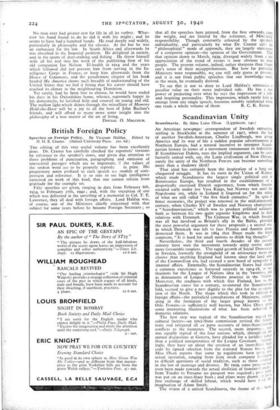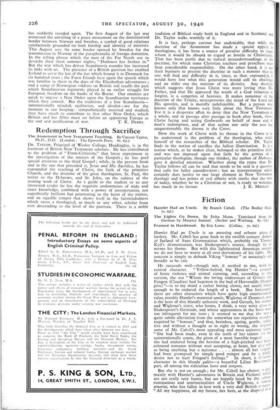Scandinavian Unity
Scandinavia. By Alma Luise Olson (Lippincott. 14s.)
AN American newspaper correspondent of Swedish extraction, settling in Stockholm in the summer of 1927, when the feat of another Swedish-American, Charles Lindbergh, was giving America and its way of life a sudden popular advertisement in Northern Europe, had a natural incentive to interpret Scandi- navian history in terms of a movement tantamount to federalism. If Scandinavian Dakota, runs the implied argument, can be satis- factorily united with, say, the Latin civilisation of New Orleans, surely the unity of the Northern Powers can become something more than a shadowy ideal?
That ideal has certainly been the inspiration of a long and chequered struggle. It has its roots in the Union of Kalmar, which made Scandinavia the largest single political unit in Renaissance Europe, but resulted in the establishment of a despotically exercised Danish supremacy, from which Sweden escaped early under her Vasa Kings, but Norway not until the Napoleonic era, while in Iceland it lingered on for the whole of what are still called " the five black centuries." In spite of bitter memories, the project was renewed in the mid-nineteenth century, when Charles XV of Sweden and Norway championed a " Scandinavianism," which was to produce political solidarity both as between his two quite separate kingdoms and in their relations with Denmark. The Crimean War, in which Sweden was all but involved as Britain's ally in the Baltic, provided the most powerful argument for these proposals ' - a second war, in which Denmark was left to face Prussia and Austria alone, destroyed them. It was in 1864 that Ibsen made the bitter comment, " It is hard for small nations to think big thoughts." Nevertheless, the third and fourth decades of the present century have seen the movement towards unity revive under more favourable auspices. The rapid growth of Social Democracy in Sweden, formerly the stronghold of an aristocracy more ex- clusive than anything England had known since the land sales of the Cromwellian era, had created a new bond of sympathy in internal affairs. Externally, the Scandinavian States had shared a common experience as harassed neutrals in 1914-18, as en- thusiasts for the League of Nations idea in the 'twenties, and as denouncers of League of Nations practice in the 'thirties. Moreover, the readiness with which free Finland, lost to the Scandinavian cause for a century, re-entered the Scandinavian fold, seemed to give a new dignity to the plea for the co-opera- tion of the North. The shape which this took in relation to foreign affairs—the periodical consultations of Ministers, culmin- ating in the formation of the larger group known as the Oslo Powers—is sufficiently well known, but Miss Olsen gives some interesting illustrations of what has been achieved in domestic relations.
The first step was typical of the Scandinavian regard for cultural factors—an inter-State commission revised the history texts and relegated all ex parte accounts of inter-Scandinavian conflicts to the footnotes. The second, mote importan,, step was equally typical of the four nations which, throughout the annual discussions at Geneva, have pleaded for a juridica; rathzt than a political interpretation of the League Covenant. Accord-
ingly, they have set about the creation of an inter-State legal, code by agreed selection from the national Statute boo and Miss Olsen reports that some 3o regulations have co :le into
actual operation, ranging from joins stock company le.:Islati°11, to difficult questions of social tradition, such as those 'nava. in the law of marriage and divorce. By 1939, some progress had even been made towards the actual abolition of frontier-h arier5:- from Tonder to Petsamo no passport was required ; poor relief was put on an inter-State basis ; and plans were drawn IT for
, free exchange of skilled labour, which would have fired imagination of Adam Smith.
The vision of a united Scandinavia, the theme of di,- bc'c&'
has suddenly receded again. The first August of the last war witnessed the unveiling of a peace monument on the demilitarised border between Norway and Sweden, a symbol of good relations satisfactorily grounded on both kinship and identity of interests. This August sees the same border opened by Sweden for the transmission to Norway of the paraphernalia of foreign dominion. In the telling phrase which the men of the Far North use to describe their short summer nights, " Darkness has broken in." But the war which has driven Scandinavia asunder has increased its links with us. The presence of a British garrison has enabled Iceland to sever the last of the ties which bound it to Denmark for six hundred years ; the Faroe Islands hear again the speech which was familiar to them in the days of the Elizabethan adventurers ; and a camp of Norwegian soldiers on British soil recalls the part which Scandinavian regiments played in an earlier struggle for European freedom on the banks of the Boyne. Our enemies are quick to impose a New Order upon the Scandinavian territories which they control. But the traditions of a free Scandinavia— internationally minded, egalitarian, and idealist—are for the moment in our keeping: sympathetically received and studied, they have much to contribute to that other New Order, which Britain and her Allies must set before an appraising Europe as



























 Previous page
Previous page